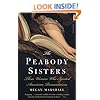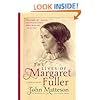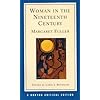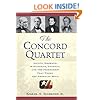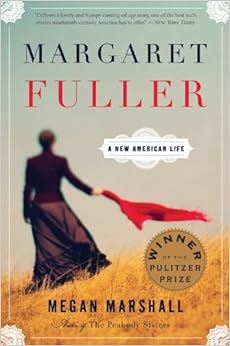
Margaret Fuller: A New American Life
and over one million other books are available for Amazon Kindle. Learn more


Flip to back
Flip to front


Margaret Fuller: A New American Life Paperback – March 4, 2014
See all 9 formats and editions
Hide other formats and editions
| Amazon Price | New from | Used from |
|
MP3 CD, Audiobook, MP3 Audio, Unabridged
"Please retry"
|
$7.75 | $9.07 |

$10.98
FREE Shipping on orders over $35.
In Stock.
Ships from and sold by Amazon.com.
Gift-wrap available.
NO_CONTENT_IN_FEATURE
Start reading Margaret Fuller: A New American Life on your Kindle in under a minute.
Don't have a Kindle? Get your Kindle here, or download a FREE Kindle Reading App.
Don't have a Kindle? Get your Kindle here, or download a FREE Kindle Reading App.
Best Books of the Month
Want to know our Editors' picks for the best books of the month? Browse Best Books of the Month, featuring our favorite new books in more than a dozen categories.
Want to know our Editors' picks for the best books of the month? Browse Best Books of the Month, featuring our favorite new books in more than a dozen categories.
Product Details
Would you like to update product info or give feedback on images?.
|
Editorial Reviews
From Booklist
*Starred Review* “The mind has a light of its own,” wrote Margaret Fuller, and the radiance of her inner world vitalizes Marshall’s profoundly simpatico portrait of this path-breaking feminist and courageous journalist and writer. Marshall encountered Fuller while working on her acclaimed first book, The Peabody Sisters (2005), and she inhabits Fuller’s dramatic, oft-told story with unique intimacy by virtue of her fluency in and judicious quoting of Fuller’s extraordinarily vivid letters. Marshall conveys Fuller’s “passionate intensity,” “unusual intellect and outsized personality,” “expansive sympathy,” and extraordinary valor as she illuminates family struggles, social obstacles, and private heartache in conjunction with each phase of Fuller’s phenomenal achievements as an innovative teacher, lecturer, and editor. Marshall brings stirring historical and psychological insights to Fuller’s complicated relationship with Emerson and the other transcendentalists, her journey west and response to the horrific plight of Native Americans, her gripping dispatches on social ills as a front-page columnist for Horace Greeley’s New York Tribune, and her triumphs in Europe as “America’s first female foreign correspondent.” How spectacularly detailed and compassionate Marshall’s chronicle is of Fuller’s scandalous love for an Italian soldier, the birth of their son, her heroic coverage of the 1849 siege of Rome, and her and her family’s tragic deaths when their ship wrecks in sight of the American coast. A magnificent biography of a revolutionary thinker, witness, and writer. --Donna Seaman
--This text refers to an out of print or unavailable edition of this title.
Review
"Megan Marshall's brilliant Margaret Fuller brings us as close as we are ever likely to get to this astonishing creature. She rushes out at us from her nineteenth century, always several steps ahead, inspiring, heartbreaking, magnificent." — Rebecca Newberger Goldstein, author of Betraying Spinoza: The Renegade Jew Who Gave Us Modernity
"Megan Marshall gives new meaning to close reading—from words on a page she conjures a fantastically rich inner life, a meld of body, mind, and soul. Drawing on the letters and diaries of Margaret Fuller and her circle, she has brought us a brave, visionary, sensual, tough-minded intellectual, a ‘first woman’ who was unique yet stood for all women. A masterful achievement by a great American writer and scholar.” — Evan Thomas, author of Ike’s Bluff: President Eisenhower’s Secret Battle to Save the World
"Megan Marshall’s Margaret Fuller: A New American Life is the best single volume ever written on Fuller. Carefully researched and beautifully composed, the book brings Fuller back to life in all her intellectual vivacity and emotional intensity. Marshall’s Fuller overwhelms the reader, just as Fuller herself overwhelmed everyone she met. A masterpiece of empathetic biography, this is the book Fuller herself would have wanted. You will not be able to put it down." — Robert D. Richardson, author of Emerson: The Mind on Fire
"Megan Marshall gives new meaning to close reading—from words on a page she conjures a fantastically rich inner life, a meld of body, mind, and soul. Drawing on the letters and diaries of Margaret Fuller and her circle, she has brought us a brave, visionary, sensual, tough-minded intellectual, a ‘first woman’ who was unique yet stood for all women. A masterful achievement by a great American writer and scholar.” — Evan Thomas, author of Ike’s Bluff: President Eisenhower’s Secret Battle to Save the World
"Megan Marshall’s Margaret Fuller: A New American Life is the best single volume ever written on Fuller. Carefully researched and beautifully composed, the book brings Fuller back to life in all her intellectual vivacity and emotional intensity. Marshall’s Fuller overwhelms the reader, just as Fuller herself overwhelmed everyone she met. A masterpiece of empathetic biography, this is the book Fuller herself would have wanted. You will not be able to put it down." — Robert D. Richardson, author of Emerson: The Mind on Fire
"Fuller’s was a great life, flush with drama, and Megan Marshall’s new biography rises to it in ways small and large . . . This one pitches Ms. Marshall into the front rank of American biographers . . . 'Margaret Fuller' is as seductive as it is impressive . . . In Ms. Marshall, Fuller has found what feels like her ideal biographer." -- New York Times
"A lively, intuitive study of a remarkable American character.” — Kirkus Reviews
"The book's success comes from the way that Marshall allows the reader to understand and empathize with Fuller in her plight." — Publishers Weekly
"[Marshall] inhabits Fuller’s dramatic, oft-told story with unique intimacy by virtue of her fluency in and judicious quoting of Fuller’s extraordinarily vivid letters . . . Marshall brings stirring historical and psychological insights to Fuller’s complicated relationship with Emerson and the other transcendentalists, her journey west and response to the horrific plight of Native Americans, her gripping dispatches on social ills as a front-page columnist for Horace Greeley’s New York Tribune, and her triumphs in Europe as 'America’s first female foreign correspondent.' How spectacularly detailed and compassionate Marshall’s chronicle is of Fuller’s scandalous love for an Italian soldier, the birth of their son, her heroic coverage of the 1849 siege of Rome, and her and her family’s tragic deaths when their ship wrecks in sight of the American coast. A magnificent biography of a revolutionary thinker, witness, and writer." —Booklist starred review
--This text refers to an out of print or unavailable edition of this title.
More About the Author
Discover books, learn about writers, read author blogs, and more.
Customer Reviews
Most Helpful Customer Reviews
26 of 27 people found the following review helpful
By
Reader from Washington, DC
VINE VOICE on January 30, 2013
Format: Hardcover
Vine Customer Review of Free Product
(
What's this?
)
Comment
Sending feedback...
In the early 19th century, women had only three possible careers: homemakers, teachers and prostitutes. All other jobs went to men. A woman -- especially a woman with physical disabilities -- was expected to live a hidden life. Margaret Fuller defied the social rules of her era to lead a full and exciting public life and advocated that other women be given the same opportunities.
Margaret had a malformed spine -- one shoulder was much higher than the other -- crippling migraines, painful nearsighted vision problems, short height (five feet, two inches), and occasional clinical depressions. She was also not pretty, so when she fell in love with men, they wanted to be "friends." Her family lost all their money when her father died in her late twenties, leaving her to support five siblings and her mother.
But instead of succumbing to her problems, Margaret simply tried harder. She eventually became the respected author of one of the first books on women's rights and a foreign correspondent in Europe for an American newspaper.
Once in Europe, Margaret fell in love with an Italian nobleman who adored her. They had an affair, a pregnancy, a marriage and a baby, in that order. It seemed as if Margaret had finally achieved all of her life goals, when she and her husband and baby were killed in a shipwreck on their way home to America shortly after Margaret's 40th birthday. I felt so badly losing her at a young age -- I was so happy for her successes. Her story will inspire anyone who has struggled with disabilities and prejudice.
The author has also written another text, "The Peabody Sisters," about three women from Margaret's social circles who also broke out of the confining roles that imprisoned women in that era.
Margaret had a malformed spine -- one shoulder was much higher than the other -- crippling migraines, painful nearsighted vision problems, short height (five feet, two inches), and occasional clinical depressions. She was also not pretty, so when she fell in love with men, they wanted to be "friends." Her family lost all their money when her father died in her late twenties, leaving her to support five siblings and her mother.
But instead of succumbing to her problems, Margaret simply tried harder. She eventually became the respected author of one of the first books on women's rights and a foreign correspondent in Europe for an American newspaper.
Once in Europe, Margaret fell in love with an Italian nobleman who adored her. They had an affair, a pregnancy, a marriage and a baby, in that order. It seemed as if Margaret had finally achieved all of her life goals, when she and her husband and baby were killed in a shipwreck on their way home to America shortly after Margaret's 40th birthday. I felt so badly losing her at a young age -- I was so happy for her successes. Her story will inspire anyone who has struggled with disabilities and prejudice.
The author has also written another text, "The Peabody Sisters," about three women from Margaret's social circles who also broke out of the confining roles that imprisoned women in that era.
Thank you for your feedback.
If this review is inappropriate, please let us know.
Sorry, we failed to record your vote. Please try again
36 of 40 people found the following review helpful
By
Corinne H. Smith
VINE VOICE on January 27, 2013
Format: Hardcover
Vine Customer Review of Free Product
(
What's this?
)
2 Comments
Sending feedback...
Fans have eagerly anticipated Megan Marshall's second book ever since they closed the back cover on her first one, The Peabody Sisters: Three Women Who Ignited American Romanticism. Ms. Marshall is a thorough researcher, however; and such in-depth studies take time. She also hinted on at least one public occasion that she had compiled enough material on the Peabody sisters to be able to continue their story in another volume. Instead, she has chosen this time to approach the topic of Margaret Fuller. Interesting.
The life of Margaret Fuller (1810-1850) is not a tale that can be told simply. She was a complex and busy woman, and your head can start throbbing, just reading about her. Margaret was a voracious reader, a talented writer, a ground-breaking feminist, a colleague of the American transcendentalists, a magazine editor, a journalist bent on social justice, a foreign correspondent, a nurse, and an expatriate who spent her last years in Europe, where she eventually gained a husband (or at least, a lover) and nine months later, a son. This mostly home-schooled "professional character" (her own words) and self-taught formidable genius could not always conceal her super-sensitive soul. And for most of her adult life, she had to seek deliberate success with her writing / editing / teaching / conversing skills in order to make enough money for her family to survive. Intellectual creativity and financial security can indeed be tough masters to accommodate simultaneously.
Much can be learned about Margaret by studying her relationships: with her father, with her mother, with male friends, with female friends, with intimate companions, and even with herself.Read more ›
The life of Margaret Fuller (1810-1850) is not a tale that can be told simply. She was a complex and busy woman, and your head can start throbbing, just reading about her. Margaret was a voracious reader, a talented writer, a ground-breaking feminist, a colleague of the American transcendentalists, a magazine editor, a journalist bent on social justice, a foreign correspondent, a nurse, and an expatriate who spent her last years in Europe, where she eventually gained a husband (or at least, a lover) and nine months later, a son. This mostly home-schooled "professional character" (her own words) and self-taught formidable genius could not always conceal her super-sensitive soul. And for most of her adult life, she had to seek deliberate success with her writing / editing / teaching / conversing skills in order to make enough money for her family to survive. Intellectual creativity and financial security can indeed be tough masters to accommodate simultaneously.
Much can be learned about Margaret by studying her relationships: with her father, with her mother, with male friends, with female friends, with intimate companions, and even with herself.Read more ›
Thank you for your feedback.
If this review is inappropriate, please let us know.
Sorry, we failed to record your vote. Please try again
13 of 13 people found the following review helpful
By
Mary Lois Timbes
on January 28, 2014
Format: Kindle Edition
Comment
Sending feedback...
I have been interested in liberated women since Betty Friedan first published THE FEMININE MYSTIQUE, but only lately have I explored the lives of such 19th century examples as Elizabeth Cady Stanton, Matilda Joslyn Gage and Susan B. Anthony. In reading books about them--and in the glowing LOUISA AND MARMEE--the name of Margaret Fuller kept coming up, and I knew I had to find out what I could about her to add to my list of unsung heroines and forgotten women of the early days of the Women's Rights movement, known then only as "the woman question."
Margaret Fuller was the lynchpin of the movement, being one of the only women to work outside the home, support her family of origin without the aid of a legacy, a university education, or a husband. She taught what she had learned--of the classics, of languages, and philosophy--in the days when a woman couldn't teach (or study) at the university level, through classes she called "Conversations," challenging her female students to engage their minds with more than needlework and household chores. She was a close friend and confidante of Ralph Waldo Emerson and helped to establish the Transcendentalist movement by being the first editor of THE DIAL, an intellectual magazine. When she was not paid for that work, she took a job as a reporter and writer on Horace Greeley's NEW YORK TRIBUNE, and paved the way for foreign correspondents by submitting articles to him after she moved abroad, even reporting on conditions in war-torn Italy in 1848.
She was courageous and wise, and lived the life of a "new woman" before the term had been coined. Megan Marshall's book is detailed and moving, giving us the insights that made Fuller what she was--a forerunner to the women who came a century later and probably don't even know her name.Read more ›
Margaret Fuller was the lynchpin of the movement, being one of the only women to work outside the home, support her family of origin without the aid of a legacy, a university education, or a husband. She taught what she had learned--of the classics, of languages, and philosophy--in the days when a woman couldn't teach (or study) at the university level, through classes she called "Conversations," challenging her female students to engage their minds with more than needlework and household chores. She was a close friend and confidante of Ralph Waldo Emerson and helped to establish the Transcendentalist movement by being the first editor of THE DIAL, an intellectual magazine. When she was not paid for that work, she took a job as a reporter and writer on Horace Greeley's NEW YORK TRIBUNE, and paved the way for foreign correspondents by submitting articles to him after she moved abroad, even reporting on conditions in war-torn Italy in 1848.
She was courageous and wise, and lived the life of a "new woman" before the term had been coined. Megan Marshall's book is detailed and moving, giving us the insights that made Fuller what she was--a forerunner to the women who came a century later and probably don't even know her name.Read more ›
Thank you for your feedback.
If this review is inappropriate, please let us know.
Sorry, we failed to record your vote. Please try again

